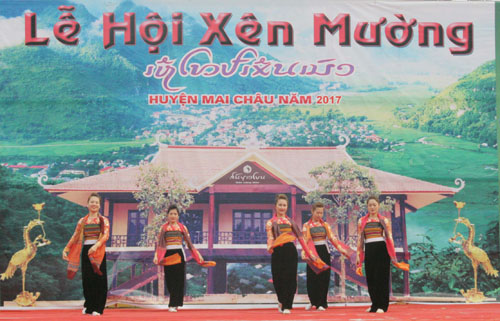


Xen Muong festival has become a shared event of many ethnic minority groups in the province and neighbouring localities as well as tourists who come to enjoy the traditional culture, art and foods of Thai people.
At Xen Muong festival 2017 in Chieng Chau commune, we met locals and groups of young students from Hanoi and foreign tourists who came to discover Thai culture.
Nguyen Hoang Anh from the Hanoi University of Culture, said that she and her friends were touring La village when she heard about the festival. The group decided to join the event to discover the cultural identity of the locality. Arriving in Mai Chau in Spring, they also enjoyed peach blossom, rice fields and beautiful natural landscapes as well as hospitable locals.
Vi Thi Hung from Mai Ha commune said that her family attend the festival every year and that locals in many neighbouring communes also join the Xen Muong festival, wishing for a new year of health, happiness and success.

Dance performance featuring Thai culture identity at the festival
Xen Muong festival 2017 was held at communal level and divided into worship and festive activities. After a drum beat to open the festival by leaders of the Chieng Chau commune People’s Committee, the chair of the festival Ha Van Hoan and participants started the worship ceremony and lit incense in Bon village’s temple.
The festive parts were eventful with various art performances, "keng long” dance (traditional dance of Thai people), drum and gong playing by local artists.
Various cultural activities and games were also held, including a tug of war, volleyball, crossbow shooting, and a food exhibition.
A new feature of the event this year was the upgraded Bon village temple, which serves as a venue for spiritual activities of locals. Within the framework of the festival, villages across the commune introduced dishes featuring Thai people’s culture, including steamed violet glutinous rice mixed with cassava, forest vegetables, and young bamboo cooked with chicken. Locals also sold brocade, purple garlic and forest vegetables.
The event was part of activities of the Hoa Binh Tourism Week for the National Tourism Year 2017 Lao Cai-Tay Bac.
Ha Trong Luu, Chairman of Chieng Chau People’s Committee said that Xen Muong festival of Thai ethnic minority group has been held for generations. After fading due to difficult organising conditions, in 2011, Mai Chau district restored the festival and maintained its original values as well as unique spiritual practices and long-lasting traditions, he said.
The festival was hosted by Chieng Chau as it is the homeland of Thai people who migrated from Bac Ha in Lao Cai in the 8th century. Throughout history, generations of Thai people, together with other groups in the locality, have made significant contributions to turning the land into a prosperous area. They showed solidarity and loyalty to follow Kings by fighting invaders to safeguard the nation.
In the Le reign, the Thai Lord in Mai Chau led Thai people to fight enemies from the north and was honoured by Le King with the "Dau tu khau truc trung hau” title which was called "tuong su” (lord of the region) by Thai people.
Xen Muong festival shows the gratitude of people to their ancestors and prays for a peaceful country, prosperity, favourable weather, bumper crops and happy families.
The festival is also a chance for tourists to discover the cultural traditions of Thai people. This is part of activities to honour national cultural identity, while strengthening the promotion of the history and cultural tourism potential of Mai Chau.
Huong Lan